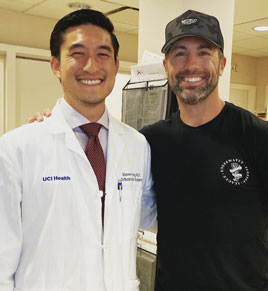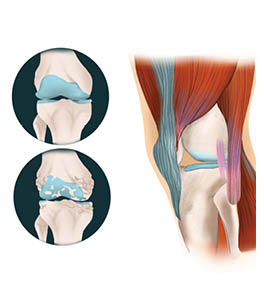
Avascular Necrosis
UCI Health orthopaedic physicians will diagnose and treat avascular necrosis of the hip, before it becomes a deformity, leading to reduction of pain, improved mobility and quality of life.
They can give you the steps to help reduce your chances of getting avascular necrosis of the hip later on.

Get treatment for avascular necrosis
If you want to live a more mobile, pain-free life, our orthopaedic physicians are here for you.
To learn more, call 714-456-7012.

Find an orthopaedics clinical trial
Talk to your doctor to see if a orthopaedics clinical trial is right for you.
Featured Blog Posts

Live Well’s most popular stories of 2023
Take a peek at our readers' favorite articles of the year.

Partial knee replacement revitalizes life of Marine

A novel approach to treating knee arthritis
A first-in-human clinical trial shows promise as a nonsurgical way to keep aging knees strong and pain-free.
Symptoms of avascular necrosis
Avascular necrosis or osteonecrosis, often develops gradually. The earliest symptoms are nonspecific and may be caused by other, less serious health conditions.
If you experience any of the symptoms below and are at risk for avascular necrosis of the hip, see your physician.
- Groin pain is the most common symptom, especially with weight-bearing activities
- Buttock, thigh and knee pain
- Limping
Diagnosing avascular necrosis
If you are experiencing any of the signs or symptoms of avascular necrosis, you can schedule a consultation with a UCI Health orthopaedic physician.They will ask about your symptoms and medical history and perform a physical exam, checking the joint's range of motion and tenderness. Imaging tests will also be ordered to get a better look at the bones and help make a conclusive diagnosis.
Avascular necrosis treatment at UCI Health
Your physician will work with you to develop a treatment plan, which will depend on the stage of the disease and your lifestyle. Treatment options include the following:
Conservative treatment
Treating avascular necrosis conservatively may delay the need for surgery in some patients.Taking nonsteroidal anti-inflammatory drugs (NSAIDs) and other pain relievers can help alleviate symptoms. Non-weight-bearing exercises, such as swimming or cycling, may prevent or minimize the progression of the disease.
Surgery
In the long-term, surgery to treat avascular necrosis may become necessary, especially if your condition is more developed.
There are several surgical procedures used; the method depends upon the extent of the disease, your age and health. Potential surgical options include:
- Bone grafts
- Decompression of the inside of the bone
- Realignment of the bone
- Arthroscopy
- Prosthetic hip replacement
Prevention
To help reduce your chances of getting avascular necrosis of the hip, your physician may suggest the following:
- Avoid injury, particularly bone fractures and joint dislocation
- Keep the dosage and duration of cortisone-like drugs to a minimum
- Avoid decompression disease when diving underwater
Why choose UCI Health for avascular necrosis care?
When referred to an avascular necrosis surgeon by your primary care doctor, you will undergo an examination and imaging. Once the extent of the tear is determined, your surgeon will work with you to develop a treatment plan for recovery.This usually involves minimally-invasive surgery, followed by up to six months of physical rehabilitation.
Your surgeon will work closely with physical therapists to tailor the rehabilitation process to you specifically.
As Orange County’s only academic health system, UCI Health has access to the latest technologies and can coordinate care between various specialties to ensure you are getting the most comprehensive care available.




